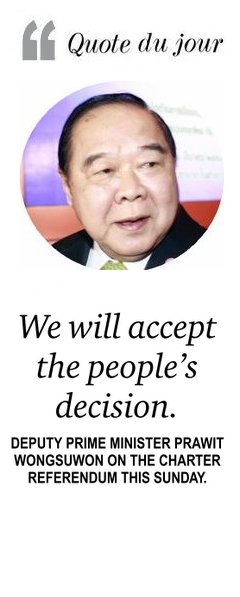
Opponents of the draft constitution are playing down the risk that a new charter could be even more undemocratic if the draft is voted down in Sunday's referendum.
They believe the regime will listen to the voices of those who vote "No" and come up with a better draft charter if the version prepared by the Constitution Drafting Committee (CDC) led by Meechai Ruchupan fails at the poll.
The vote "No" camp is made up not only of anti-government groups such as the red-shirt United Front for Democracy against Dictatorship (UDD) and the Pheu Thai Party, but extends to cover the Democrat Party leader as well as many noted public figures.

Prime Minister Prayut Chan-o-cha and his deputies, Prawit Wongsuwon and Wissanu Krea-ngam, have repeatedly given assurances that the government will stick to the roadmap to hold the election next year, no matter what the outcome of the referendum.
This indicates the regime is confident it can deal with the situation after the vote and that Gen Prayut must have a back-up plan to ensure the time frame to restore democracy is not affected.
- See also: Regime blasts foreigners' warnings
- Thitinan Pongsudhirak: Top-down rules can't work
- New poll demanded: Sunday vote fails to meet international standards
- Constitutional experts: Charter alone won't heal conflicts
- Thaksin's opinion: Nightmare of contradiction and confusion
- Gallery of 'referendum circus': Elephants, horses, monkeys - and students
Democrat leader Abhisit Vejjajiva told the Bangkok Post many people have decided they will vote in support of the draft because they fear if they reject the draft they may get something even worse. Others reasoned they were reluctant to vote in the same way as the red shirts who boycotted the draft even before it was written, he said.

Mr Abhisit said he had spent a lot of time contemplating the issue before he announced his stance against the draft.
The former prime minister stressed the draft charter is riddled with flaws, and said the regime should not use scaremongering to sway voters.
The first draft charter drawn up by the previous CDC led by Bowornsak Uwanno was rejected by the defunct National Reform Council (NRC) and if this draft charter is voted down in the referendum, the regime could not afford to apply the old approach to have a third draft constitution drawn up, Mr Abhisit said.
"Both Gen Prayut and Mr Wissanu said they will not use the old approach," Mr Abhisit said.
"All the power rests with the prime minister. Gen Prayut must listen to the voices of people who do not accept the draft if the draft is voted down.
"If the draft fails, the prime minister must assess why."
In the event the draft is shot down, Mr Abhisit said he believed the National Council for Peace and Order (NCPO) will not defy the public and create unrest by producing a new constitution that is much worse than the previous two draft charters.
"I believe the NCPO must think of the future and come up with good solutions," he said.
Former Democrat Party leader and former prime minister Chuan Leekpai supported Mr Abhisit's stance against the draft charter.
Though it is not the party's resolution, Mr Abhisit's stance is in line with the principle of democracy, he said.
"The country changed to democracy 84 years ago, so we cannot afford to step backwards, but we must move forwards," Mr Chuan said in a speech at a party to mark Mr Abhisit's 52nd birthday on Wednesday.
Somkiat Onwimon, a media guru and former senator, has also announced he will not accept the draft charter. He told the Bangkok Post the draft charter is "anything but democratic".
"I believe if the draft passes the referendum, fresh conflict will erupt in the near future. I will not accept the draft which was drawn up at the behest of the military because the military is inept in [matters of] democracy," Mr Somkiat said.
Sombat Thamrongthanyawong, former rector of the National Institute of Development Administration, said that it is unclear whether something worse will occur if the draft is voted down.
"What is for sure is that this draft is very bad. A coalition government will be too weak to implement any reforms," Mr Sombat said, referring to an electoral system under the draft charter that will create a weak coalition government and increase political instability.
"If the majority of voters reject the draft, the NCPO must find the weaknesses and make improvements.
"They should not draw up a new constitution that could be much worse. If and when a new constitution drawn up by the NCPO is enacted and it turns out to be much worse, then it will definitely face resistance," Mr Sombat said.
Mr Sombat said that even though the NCPO has sweeping powers at its disposal, it still cannot push through reform, particularly police reforms.
In light of this, he said he has no hope that a weak coalition government after the election will succeed in police reform.
Pheu Thai key figure Khunying Sudarat Keyuraphan has opposed the draft charter, saying one of its flaws is the draft is designed in a way that makes it hard to amend.
She also criticised a campaign by some state agencies to urge the public to accept the draft first and any provisions deemed as flaws could be amended later.
"It is wrong to urge people to accept the draft and say the charter can be amended later," Khunying Sudarat said on Facebook.
"This is because it is impossible to amend this constitution."
